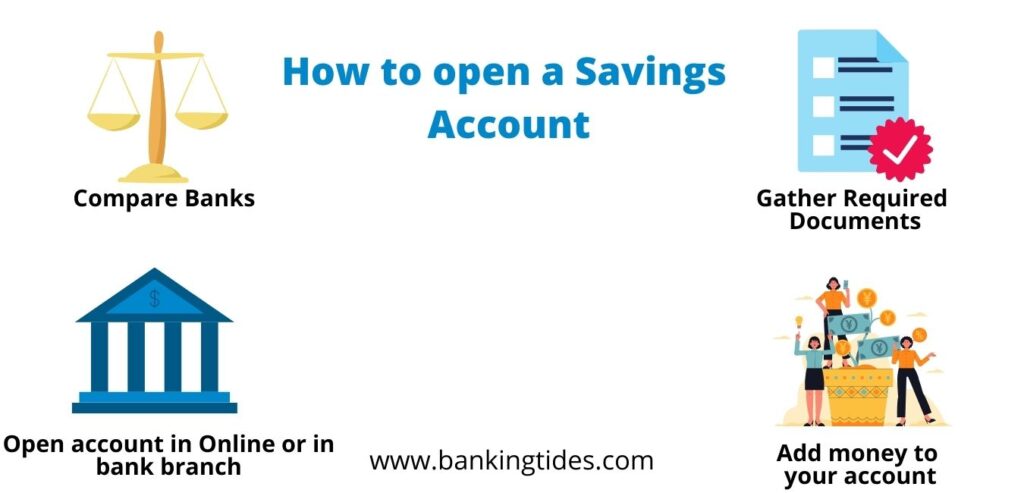Generally, a Savings Account is one of the traditional services which bank offers to you. It allows you to store your money and earns interest on your savings.

What is a Savings Account?
A savings account is a basic type of bank accounts that allows you to deposit money, keep it safe, withdraw funds, and above all earn interest. As the name suggests, the main purpose of a savings account is saving funds for your future use.
Savings accounts offered by banks (including cooperative banks) and other financial institutions are DICGC insured and typically pay interest on your deposits. Banks offers much type of savings accounts depending upon the needs of the customer. Some savings accounts offer higher interest rates than others.
TIP: If you are looking to grow your money more quickly and also wants to keep your money safe, stay up to date with all banks’ savings accounts and their interest rates
Keeping cash elsewhere that you don’t plan to spend in the immediate future is unsafe. It’s tempting to spend money in hand. A savings account, however, can be a means of setting aside funds to reach longer-term goals.
Safety
Your money in savings account is very safe in your banks. It can be withdraw anytime and use for your immediate purposes. Cash kept outside of the bank can get stolen easily. But when your money in savings accounts are insured by DICGC, you avoid the risk of losing it.
As said earlier, savings accounts offer easy access to your money. Once you are ready to spend money, you can withdraw cash or transfer funds or pay for your purchases using debit card or an electronic funds transfer. You can make cash withdrawals from your savings account at an ATM or from your bank branch.
Growth
Savings accounts pay interest on money in your account. As a result, your bank will make small additions to your account, typically once three month. The interest rate depends on economic conditions, guidelines of governing authority and your bank’s desire to compete with other banks.
Usually banks offer less rate of interest for Savings account and may not even match inflation. Similarly your risk of loss is also less when your funds are insured.
Tip: A little bit of interest income is better than nothing when there is nothing to loss
How to open a Savings Account?
Nowadays opening a savings account is very easy like buying fruits in Fruit stall. It takes very few minutes to complete the opening process in Bank branch and also in Online.
Most of the banks are offering online facility for opening savings account through their official websites and mobile banking application. The easiest ways to open an account is online mode or if you need any in-person guidance visit a bank branch.
List of Officially Valid Documents (OVD)
You have to ensure the readiness of the following officially valid documents (OVD) for opening a savings account
- Passport
- Driving License
- Voter ID
- Pan Card
- NREGA Job Card & others
- Letter issued by National Population Register containing details of name, address
- Aadhar Card
Before opening savings account, compare banks by reviewing their
- Interest rates, fees, minimum balance requirements,
- Whether providing adequate cheque books and debit card withdrawal limits
- Whether Mobile banking and Internet banking makes sense to you
- Choose the bank which is conveniently located to your accessible place.
- Open an account online or in person by submitting an application.
- Fund the account with an initial deposit if required.

To open an account, at least one account holder needs to be 18 years old or older. This specification varies from bank to bank, so ask their customer service for details if you want to open an account for a minor. There are several options available for saving money for a minor person, so evaluate all of the options.
Charges in Savings Account
Though savings accounts are typically free; there are some limitations and charges. Savings accounts generally have Monthly Average Balance (MAB) which you have to maintain.
Banks often will charge a monthly minimum balance charge if you do not maintain this monthly average balance. The fees will be withdrawn from your account, so there is a possibility you also could be charged overdraft fees if the account balance goes below zero.
Similarly, banks will charge for debit card usage annually and also for Cheque book issuance beyond the free limit. Some banks will waive these fees if you maintain a huge balance in your account.
Tip: Check your savings account periodically; bank may put these charges without notice
[…] A savings account is a basic type of bank accounts that allows you to deposit money, keep it safe, withdraw funds, and above all earn interest. As the name suggests, the main purpose of a savings account is saving funds for your future use. To know more about what is savings account? Click Here […]
[…] A savings account is a basic type of bank accounts that allows you to deposit money, keep it safe, withdraw funds, and above all it earns interest. As the name suggests, the main purpose of a savings account is saving funds for your future use. To know more about what is savings account? Click Here […]
[…] the main purpose of a savings account is saving funds for your future use. To know more about what is savings account? Click […]